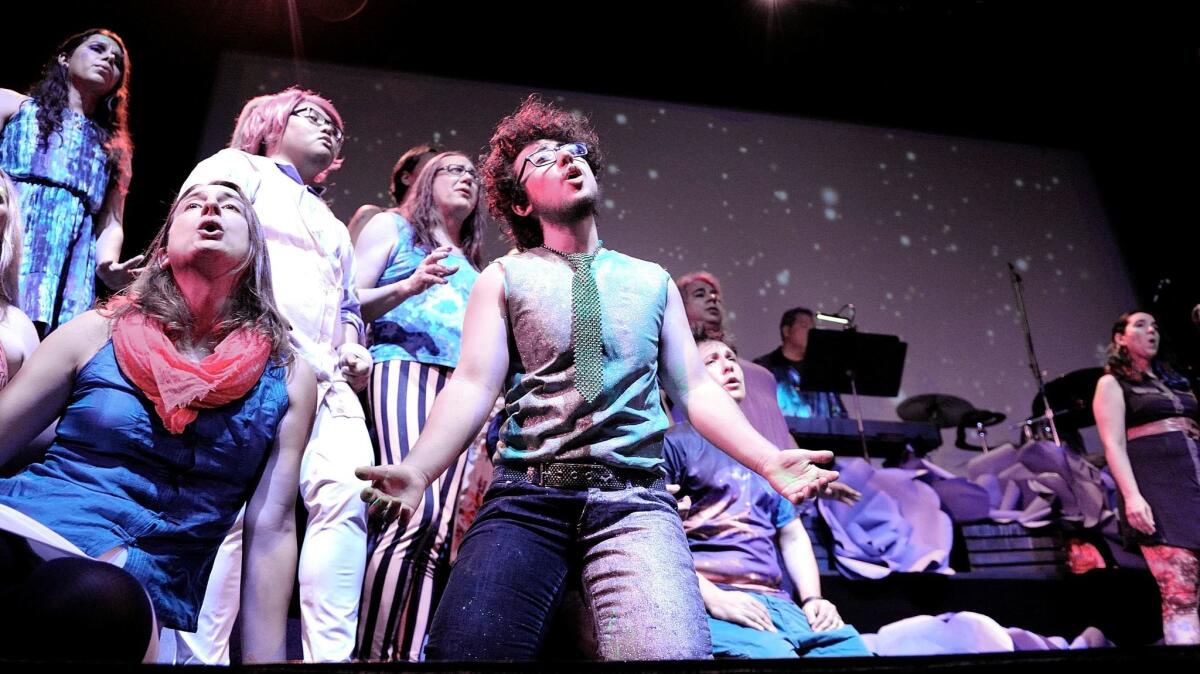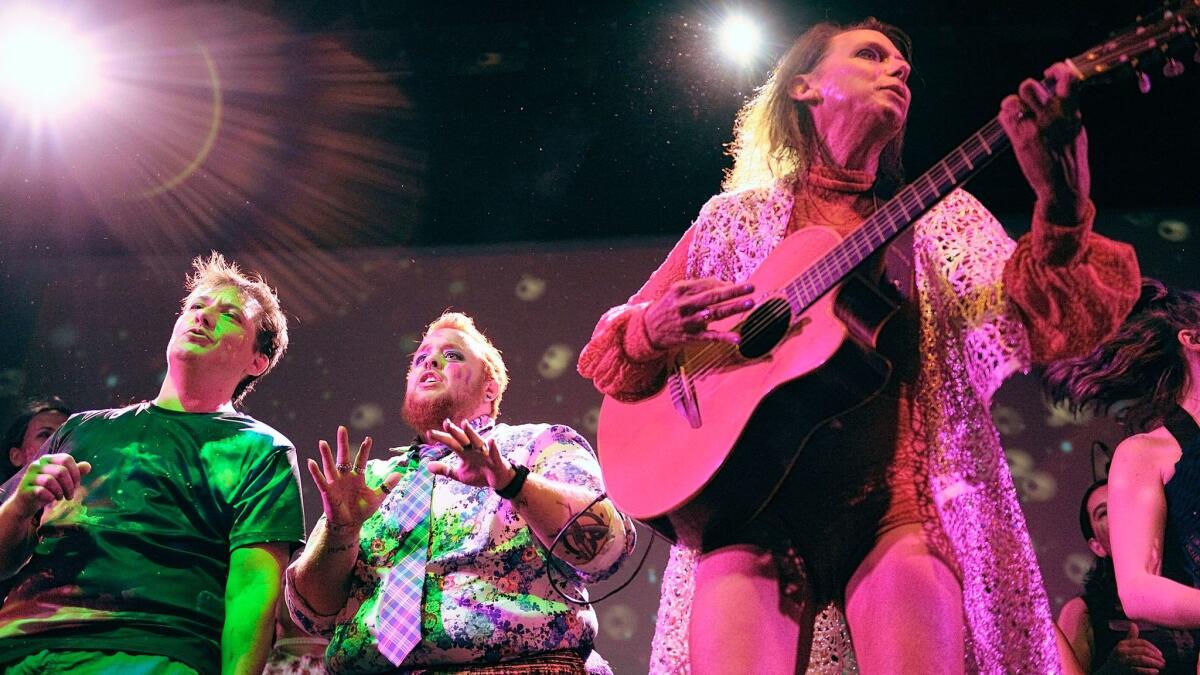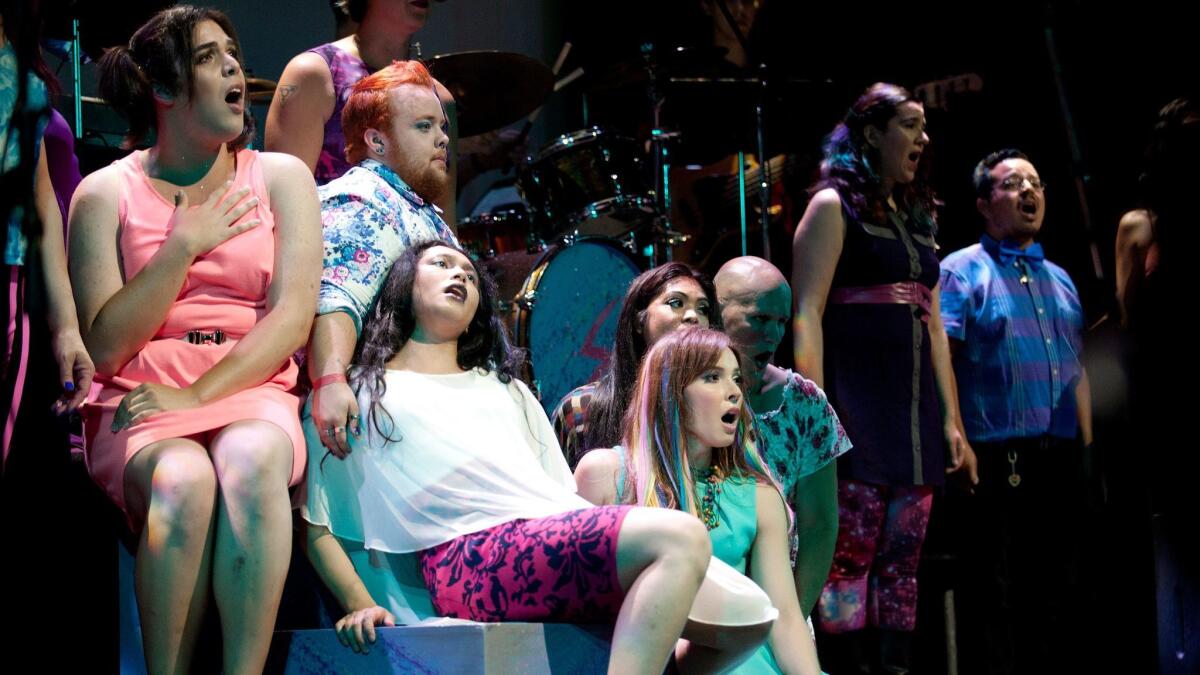Finding their true voices in the Trans Chorus

- Share via
Lindsey Deaton cues members of the chorus with rhythmic strums of her guitar as she leads them through an elaborate passion play. Onstage above her, no palm fronds or crucifixes. Instead, perched on a purple splatter-painted prop box and glistening with sweat and body glitter under the spotlight, tenor Abdullah Hall rips into the opening lines of David Bowie’s “Moonage Daydream.”
It was Saturday night at the Los Angeles LGBT Center’s 200-seat Renberg Theatre, and the Trans Chorus of Los Angeles was presenting “The Rise and Fall of Ziggy Stardust and the Spiders From Mars,” an original, fully staged dramatic production of Bowie’s 1972 album featuring choral arrangements designed specifically for this choir’s needs.
“I’m an alligator,” Hall belted triumphantly. “I’m a mama-papa coming for you.”
The capacity crowd cheered as a robed Ziggy Stardust emerged from a cluster of singers. “Don’t fake it baby, lay the real thing on me,” the choir joined in with a bold sound, singing a slightly altered version of Bowie’s lyrics. “The church of trans love, it’s such a holy place to be.”
In the courtyard after the performance Deaton is all smiles. “Now that was a trans-resurrection story,” she says.

Before she moved to Los Angeles and founded the Trans Chorus of Los Angeles, Deaton lived in Cincinnati, where she and Joan, her wife of 37 years, raised their two daughters. A classically trained choral conductor, Deaton worked in the Catholic church for 25 years. In 2013, when she came out as transgender at age 57, Deaton says she was fired as contemporary music director from the St. Peter in Chains Cathedral. (The cathedral did not respond to requests for comment.)
The loss of that job, Deaton says, was financially devastating to her and her family. Deaton says she was left to dwell with suicidal thoughts. An estimated 40% of transgender individuals attempt suicide, according to the American Foundation for Suicide Prevention. “My suicide was planned,” she shared over lunch in Los Feliz two days before opening night of “Ziggy.” “The house had already been given over to the bank. I could pull my ’99 Lexus into the garage, leave the engine on and go to sleep. I had a friend that did that.”
Instead of following through with that plan, Deaton reached out for support from friends and family. “My choice was to continue to breathe,” she says.
Then in December 2014, a transgender teen named Leelah Alcorn killed herself in Cincinnati by walking into the path of a tractor-trailer in the southbound fast lane of Interstate 75. Leelah’s death and the suicide note she left behind, in which she said her parents wouldn’t accept her female identity, rocked the city and shook Deaton to her core. To this day, Deaton is driven by the memory of Leelah, whose parents buried their child under her birth name, Joshua.
“I am constantly aware that there is a kid six feet underground in Warren County, Ohio, whose gravestone doesn’t reflect her name,” she says. “It still moves me.”
Two months after Leelah’s death, Deaton flew to L.A., where she met with Drian Juarez, the head of the Transgender Economic Empowerment Program at the Los Angeles LGBT Center. During their conversation, the idea for the Trans Chorus of Los Angeles was born. In late 2015, Deaton met with two dozen transgender men and women in a borrowed conference room for the chorus’ first rehearsal.
House had already been given over to the bank. I could pull my ’99 Lexus into the garage, leave the engine on and go to sleep. I had a friend that did that.
— Lindsey Deaton, on losing her job after coming out as a transgender woman
For many transgender men and women, the act of singing requires courage. Although testosterone causes physical changes to vocal chords that lower an individual’s range, estrogen has no effect on the voice. Because of that, many transgender women suffer from vocal dysphoria, feeling dissatisfied and even hating their low voices.
The Trans Chorus’ bass and baritone sections are full of transgender women, and singing in the chorus has helped many of them accept and love their voices.
Ann Thomas, a founding member of the chorus, is one of those bass singers.
“I love freaking people out with my voice,” she says. “But seriously, we are trying to change the way the world sees transgender people. This is one of the ways we can do that, through song and music. So people can see that we’re not just the sex workers and criminals that Hollywood has depicted us as for decades.”
Another chorus member, 24-year-old Ari Adler, experienced a different kind of vocal journey as a transgender man. He joined the choir as a tenor, but testosterone caused his voice to drop. He is now a baritone who sometimes sings bass.
Adler found the Trans Chorus through a youth group at the Children’s Hospital Los Angeles. “I thought choral singing and getting more serious about a musical hobby would be a good therapeutic space for me,” he says. “I’ve done this through transition, which is a time of extreme uncertainty. TCLA gave me stability and a way to channel my anxieties.”

The chorus creates a welcoming space for chorus members to explore and find their voices, and Deaton caters to the group’s vocal ranges by commissioning special alto-tenor-tenor-baritone-bass arrangements of songs. The chorus is made up of around 30 singers who auditioned for the group and who rehearse and perform without pay. During the last 18 months, Deaton has grown the group into a strong, confident ensemble capable of executing complex harmonies with precision. She has also built a loving community.
The singers meet every Sunday evening for rehearsals where they build technique and a cohesive sound. Midway through each rehearsal, the group breaks for a potluck meal. “We break bread together,” Deaton says. “It’s become a very important and crucial time for us.”
Deaton has a clear mission for her chorus: to save lives by increasing visibility, and to “empower the transgender, nonbinary and intersex community to discover, love, develop and use their voices.” She is adamant that the Trans Chorus be a financially viable, premier arts organization that will eventually support non-audition community choirs and education programs too.
Building that kind of arts organization and an artistically sophisticated chorus at the same time — Deaton says it is the hardest thing she’s ever done. But it’s made her the happiest she’s ever been.
“Saving lives. Fiercely empowering trans voices. Nothing but that,” she repeats. “So that Leelahs out there can look at our chorus and say, ‘That’s me,’ and hopefully choose to continue to breathe.”
SIGN UP for the free Essential Arts & Culture newsletter »
Follow The Times’ arts team @culturemonster.
ALSO
Pull off the wig and falsies, and ‘Georgia McBride’ hits its groove
Ibsen’s radical 1879 play about women’s equality gets a 2017 sequel: ‘A Doll’s House, Part 2’
Ben Feldman on his new play, nerdy man-boys and, yes, the ‘Mad Men’ nipple thing
The duel is on: ‘Spamilton,’ the hit ‘Hamilton’ parody, to launch national tour
More to Read
The biggest entertainment stories
Get our big stories about Hollywood, film, television, music, arts, culture and more right in your inbox as soon as they publish.
You may occasionally receive promotional content from the Los Angeles Times.










